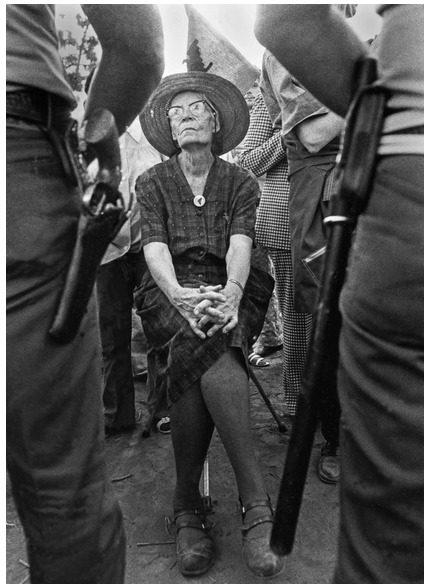A Great Inspiration –
I first learned of Dorothy Day at a memorial service in New York City, not long after her November 29, 1980, death.
As 26-year-old, NJ-based peace activist, I’d been connected by a local suburban mom/kindergarten teacher to the Atlantic Life Community, a faith-based, nonviolent group of activists based in NYC; Baltimore, MD; and Brandywine, PA. This was the community of the Plowshares 8: Fr. Dan Berrigan, former priest Phil Berrigan (for whom my 2nd daughter is named), Sister Anne Montgomery (for whom my 1st daughter is named), and five others. On September 9, 1980, they went into a GE plant in King of Prussia, PA, where casings for nuclear warheads were made. Under the Biblical edict to “beat swords into plowshares,” they poured their blood over and hammered on the casings. You can see photos and read about it in this piece by Phil’s daughter Frida Berrigan. https://wagingnonviolence.org/2020/09/plowshares-eight-king-of-prussia-40th-anniversary-nuclear-weapons-disarm/
The warhead casings were hollow, very heavy metal cones, maybe three feet high.
I know because a couple years later we borrowed one another group had liberated from the GE lawn. Our Peace Center had a table at that year’s Oktoberfest in New Brunswick and charged $1 for the chance to hammer on the casing with a rubber mallet…”Whack the warhead!” We wondered if we’d be nabbed for briefly possessing it, but no one bothered us.
But I really digressed there. As I mentioned in my post on Day 2, I began working with the Plowshares 8 Support Committee in NYC in 1981. The Dorothy Day memorial was an event I may even have helped organize. All I remember is a large, crowded room – maybe a church, maybe an auditorium – people bringing canned goods, and Dan Berrigan speaking. I was amazed and inspired by her life and by the idea of the Catholic Worker. My not-yet-husband, Bob, and I briefly talked about starting a CW house in New Brunswick. But he was an atheist, I was agnostic, and somehow it didn’t seem practical.
Forty years later, I can’t remember if I visited a Catholic Worker house in NYC or if Day’s descriptions in her books were so vivid that those images are what’s in my brain. I admit she bewildered me: I could relate so much better to her younger socialist days than I could to her religious transformation. I think Bob and I both, surrounded as we were with primarily Catholic clergy and practitioners and activism, had learned to regard the religious symbology and rituals as a foreign language that prevailed in a land in which we wanted to live. We translated it into non-religious concepts that could make sense to us.
Dorothy Day’s work was often in my mind in the mid-late 80s when Bob’s and my peace activism morphed to focus on homelessness, when activism around that seemed to demand direct service. Maybe those first dinners I made happened because I’d learned about Dorothy Day.
One evening a dinner regular/shelter participant named Adam – 60-something years old, saying he’d lived outdoors for 30 years – told me he’d been at the Catholic Worker in NYC years before. It might have been silly, but for a nanosecond I felt I was in the presence of Dorothy Day.
Oh well. Day is credited by some for a statement that decades ago became one of my core tenets: “Our problems stem from our acceptance of this filthy, rotten system.” That appeared beneath the photo below as a poster in the 1970s, possibly from the cover of the War Resisters League’s “Win” magazine. Here’s an article exploring whether she actually said that. TLDR: it may be an abbreviation/slight paraphrase of things she did say.
https://www.ncronline.org/news/people/dorothy-days-filthy-rotten-system-likely-wasnt-hers-all
Thx, Quentin Smith for sharing the article. “Today is the birthday of American activist Dorothy Day (1897). Day spent her life fighting for women’s rights, civil rights, and the poor. She was a lively and curious young woman when she landed in Greenwich Village after two years of college in Illinois. She quickly became part of the bohemian lifestyle, making friends with playwright Eugene O’Neill and writer John Reed, and working as a journalist for several socialist and progressive publications. She even interviewed Leon Trotsky. The New Yorker once referred to Dorothy Day as, “perhaps the most famous radical in the history of the American Catholic Church.”
“Today is the birthday of American activist Dorothy Day (1897) (books by this author). Day spent her life fighting for women’s rights, civil rights, and the poor. She was a lively and curious young woman when she landed in Greenwich Village after two years of college in Illinois. She quickly became part of the bohemian lifestyle, making friends with playwright Eugene O’Neill and writer John Reed, and working as a journalist for several socialist and progressive publications. She even interviewed Leon Trotsky. The New Yorker once referred to Dorothy Day as, “perhaps the most famous radical in the history of the American Catholic Church.” https://docs.google.com/…/11tNc4WWl18WyIUsGrCcO…/edit…


